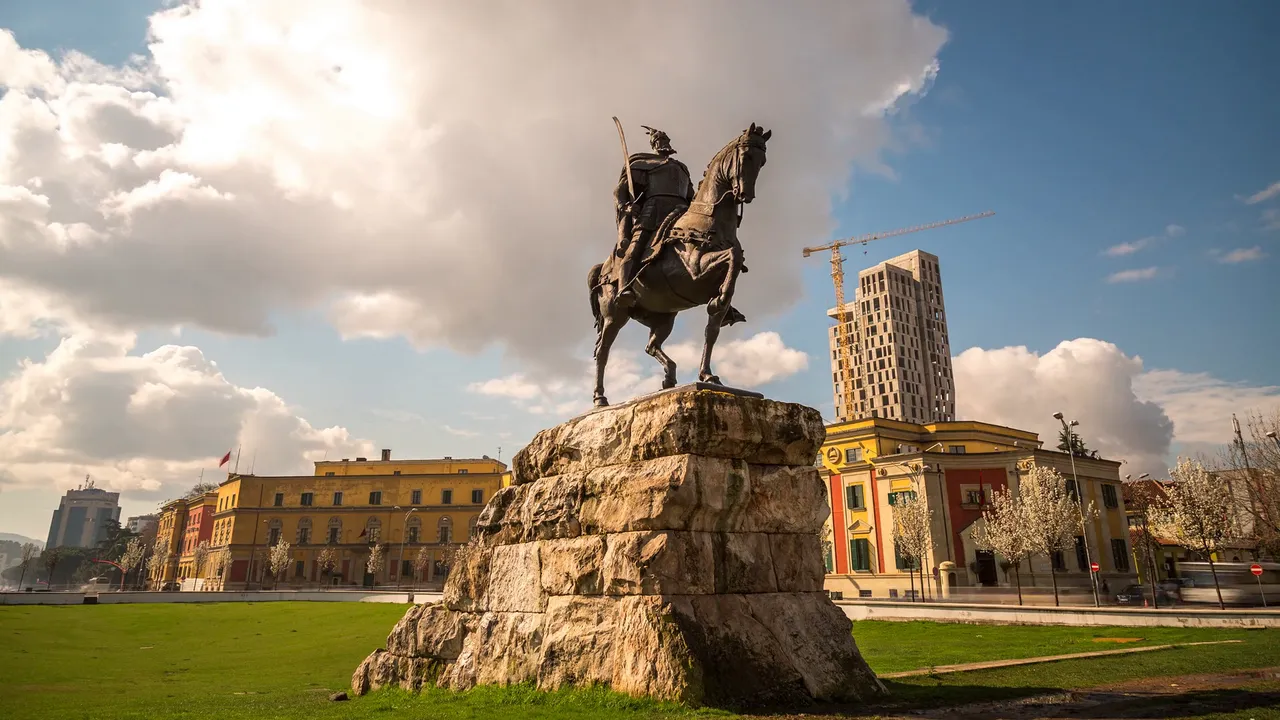
By Mathijs Koenraadt
In 1953, Russian director Sergei Yutkevich arrived to Albania, a small country of three million people located in southeastern Europe along the Adriatic Sea. Yutkevich came to direct a feature film about the life of Albania’s national hero, George Skanderbeg.
Born Gjergj Kastrioti, the man lived from the year 1405 to 1468. Taken hostage as a child by the Ottoman Turks, they named the boy after their word for Alexander the Great, İskender. Skanderbeg was to be raised as a Muslim and trained by the Turkish army to serve as a mercenary to Sultan Murad the Second.
The Sultan recognized Skanderbeg’s strength as a warrior and decided to employ his servant in an elite army of foreign slaves called the Janissaries. The leadership of the Ottoman Empire preferred employing slaves to defend their civilization because they considered foreign mercenaries more reliable than their own Muslim tribesmen. [1]
Skanderbeg spent the best part of his life with the Janissaries securing victories for his owners, the Ottomans. In the year 1443, however, after two decades of loyal service, and when faced by the Christian armies of Janos Hunyadi, Skanderbeg finally defected and returned home to his native Albania.
Though raised as a Muslim, Skanderbeg soon embraced the customs of his birthland and converted back to Christianity. For the next twenty-five years, Skanderbeg would work to unite the Albanian tribes. He would lead his own ten-thousand-man army against the Turks and, using Albania’s mountainous landscape to his advantage, win decisive victories over larger and better equipped Ottoman forces.
Historians now credit Skanderbeg with delaying the Ottoman expansion into Western Europe long enough to allow for other European armies to prepare a response. The Albanian resistance thus proved to be one of the key events of the fifteenth century that helped to keep Europe free from Islamic conquest.
The Ottomans failed to get past the Albanians, but today, Yutkevich’s film about Skanderbeg’s life would never again manage to get past liberal censors. Yutkevich’s film carries most politically incorrect dialogue and is perfectly lacking in Hollywood’s progressive self-loathing.
In the film, upon his return to Albania, Skanderbeg speaks to his people and reflects upon his years spent with the Turks:
“I would like to tell you something. Today, is the happiest day of my life. For twenty years, I have lived among dogs as if I was a dog myself. Now, finally, I am allowed to be a man again.” [2]
Can you imagine a European leader making a similar statement about growing up with diversity in Western Europe’s crime-ridden inner cities? For fifty years, open borders have forced Europeans to live as strangers, as dogs, in the cities their ancestors once built for them. Our progressive leaders have tried their best to make non-European immigrants our equals by trying to integrate our enemies into our economies.
They failed, miserably.
Instead, our controllers have merely made us equal to them.
It was precisely this type of humiliation Skanderbeg spent the second half of his life fighting against in order to liberate himself, his people, and all of Europe from Islamic slavery. The censors of the 1950s took no issue with Yutkevich’s depiction of Muslims as mouth-foaming barbarians bent on defacing Greek and Roman statues.
Such accounts are far from fictional. Not so long ago, we all witnessed combatants of the Islamic State purposefully destroying the historic city of Palmyra. We have seen mad-dogged Muslims destroy the Buddhas of Bamiyan in Afghanistan. We have seen Muslims waste their impotent energy on desecrating Western works of art the world round.
Raised by faceless mothers hiding behind the veil, perhaps nothing enrages a Muslim man more than the sight of a fair European face. If you ever wondered why so many Greek and Roman statues found in Europe’s museums happen to have lost their heads, or have their faces smashed in, it’s because Islamic invaders who colonized Italy and Greece couldn’t stand the sight of confident men and women.
In Yutkevich’s film, having given Skanderbeg a son, the free woman Mamitsa plays the role of a Wagnerian Valkyrie. Armed to the teeth, she joins the men of her tribe in battle to fight the Ottomans. But the director was careful not to portray her as a feminist. Mamitsa fought out of necessity, not out of desire. Her sole purpose for fighting alongside the men is she wishes that, once the war is over, she can be a woman again. [3]
Skanderbeg’s metamorphosis from slave to man represents the West’s evolution from barbarism to civilization. Mamitsa’s transformation from woman to warrior represents the sacrifice needed to defend it. The Ottoman Empire, a civilization defended by slaves, represents the archetypical threat to European freedom.
Our male ancestors fought for the right to be called men. Our women supported their men for the privilege to be called women. It’s no coincidence, then, that the collapse of Western civilization began with the deconstruction of traditional family.
Despite having built the only civilization on Earth everyone else wants to flee to when their own societies hit the fan, we have somehow surrendered to apathy. We have given up on ourselves. We have to turn the tide. We have to learn to fight again.
Europeans hold an obligation, both to themselves and to the kinder elements of humanity, to defend their homelands by any means necessary, lest Europe, too, becomes a civilization defended by slaves.
- Francis Fukuyama, The Origins of Political Order: From Prehuman Times to the French Revolution, 1st ed. (New York: Farrar, Straus and Giroux, 2011), chap. 13: “Slavery and the Muslim Exit from Tribalism”.
- Sergei Yutkevich, Skanderbeg, Action, Drama, History, 1954, http://www.imdb.com/title/tt0046498/.
- Yutkevich.